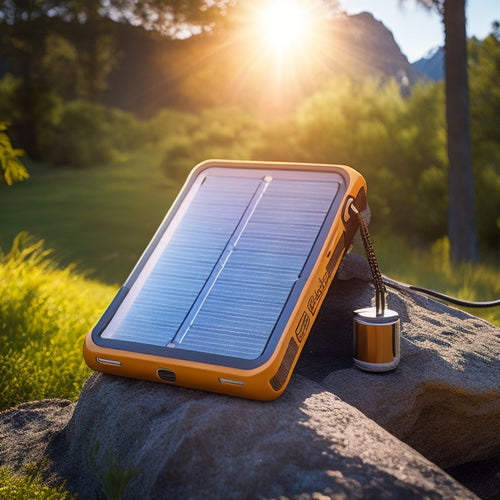
Solar Battery Back up Systems
Share
You're looking to guarantee reliable power during outages, achieve energy independence, and reduce your carbon footprint with solar battery backup systems. These systems provide continuous power for critical systems like medical equipment, preventing losses from food spoilage and electronic damage. By integrating renewable energy sources and advanced battery management, you'll maximize energy harvesting efficiency and reduce waste. With deep cycle battery technology and smart charging algorithms, you'll extend battery life and reduce maintenance costs. As you investigate the benefits of solar battery backup systems, you'll reveal how to balance performance, lifespan, and energy needs – and what it means for your energy independence.
The Essentials
- Solar battery backup systems provide reliable power during outages, ensuring energy independence for homes and businesses.
- These systems integrate renewable energy sources and advanced battery management for optimal energy usage and efficiency.
- Deep cycle battery life expectancy ranges from 5 to 15 years, depending on type, maintenance, and usage frequency.
- Solar battery systems have a longer lifespan and lower maintenance costs compared to traditional generators, with minimal upkeep needs.
- They maximize energy harvesting efficiency, reduce energy waste, and promote sustainable living with lower carbon footprints.
Reliable Power During Outages
You expect your solar battery backup system to provide power when you need it most - during outages.
With a reliable system, you're guaranteed energy independence, guaranteeing your home or business remains operational even when the grid goes down.
By choosing a high-quality solar battery backup system, you can rest assured you'll have the power you need to stay safe and productive.
Additionally, a reliable battery backup system prevents costly losses due to food spoilage and damage to electronics Power Outage Protection and guarantees continuous power supply for vital systems like medical equipment and security systems.
Power When You Need
As grid outages become increasingly frequent, reliable power backup systems are no longer a luxury, but a necessity. You need a system that can provide power when you need it most, ensuring your home remains safe and comfortable during emergency situations.
A solar battery backup system is an ideal solution, utilizing the power of solar energy to provide a sustainable and renewable source of energy. By providing an immediate and reliable source of power during outages, a solar battery backup system protects your sensitive equipment from damage caused by sudden shutdowns.
With a solar battery backup system, you can rest assured that you'll have power when the grid goes down. The system stores excess energy generated by your solar panels in a battery, allowing you to tap into it when needed. This means you'll have access to power for critical appliances, such as refrigeration, lighting, and medical equipment, even during extended outages.
Energy Independence Guaranteed
Energy Independence Guaranteed
With the grid's reliability hanging in the balance, a solar battery backup system serves as a guide of energy independence, guaranteeing reliable power during outages. You can break free from the grid's constraints and enjoy energy autonomy, where you're in control of your power needs. This means sustainable living, without relying on fossil fuels, and reducing your carbon footprint.
| Benefits | Features | Advantages |
|---|---|---|
| Renewable Resources | Solar Integration | Reduces Carbon Footprint |
| Grid Independence | Off-Grid Solutions | Energy Autonomy |
| Smart Technology | Advanced Battery Management | Optimizes Energy Usage |
| Eco-Friendly Options | Zero Emissions | Sustainable Living |
| Reliable Power | Backup Power During Outages | Peace of Mind |
Zero Energy Waste
You expect your solar battery backup system to maximize energy harvesting efficiency, and that's exactly what you get with a zero energy waste guarantee.
This means the system is optimized to capture and store every available watt, reducing energy loss to near zero.
By leveraging advanced technologies like the Tesla Powerwall home battery storage cost, you can minimize energy waste and maximize your savings.
Energy Harvesting Efficiency
By leveraging advanced technologies, solar battery backup systems minimize energy waste through optimized energy collection efficiency. You can maximize your energy independence by utilizing renewable sources, such as sunlight, and converting it into usable energy. This is made possible through high-efficiency solar panels, advanced energy conversion systems, and smart load management.
| Energy Collection Component | Efficiency Optimization | Benefits |
|---|---|---|
| Solar Panels | High-efficiency cells, optimized panel angle and orientation | Increased energy conversion, reduced waste |
| Energy Conversion System | Advanced inverters, optimized power flow | Efficient energy conversion, reduced losses |
| Battery Charging | Smart charging algorithms, optimized battery health | Extended battery life, reduced waste |
Zero Waste Guaranteed
With a zero-waste guarantee, solar battery backup systems ensure that every unit of collected energy is employed, making your energy independence a reality. This means you can rest assured that the energy you've generated is being applied to its full potential, without any waste.
You'll be contributing to sustainability practices and waste reduction, aligning with your values of freedom and environmental responsibility. By capturing the power of the sun and storing excess energy in batteries, you're not only reducing your reliance on the grid but also minimizing your carbon footprint.
Solar battery backup systems are designed to optimize energy usage, ensuring that every kilowatt-hour is accounted for. This results in significant cost savings and a cleaner, more efficient energy ecosystem.
With a zero-waste guarantee, you can trust that your investment in solar energy is paying off, both for your wallet and the planet.
Deep Cycle Battery Technology
When selecting a deep cycle battery for your solar battery backup system, you'll want to take into account two key factors: battery life expectancy and cycle depth.
Renewable energy systems, like those used in off-grid homes, rely heavily on consistent electricity supply, which makes choosing the right deep cycle battery essential. Your battery's lifespan will depend on how well it can withstand repeated charge and discharge cycles, so understanding its expected lifespan is vital.
Additionally, the depth of each cycle - or how fully the battery is discharged before recharging - will also impact its overall performance and longevity.
Battery Life Expectancy
You can expect a deep cycle battery in your solar battery backup system to last around 5 to 15 years, depending on various factors. The lifespan of your battery is influenced by the type of battery you choose, how well you maintain it, and how often you charge and discharge it.
Different battery types have varying lifespans, with flooded batteries typically lasting around 5-7 years and sealed or maintenance-free batteries lasting up to 12-15 years.
The number of charging cycles your battery can handle also affects its lifespan. A charging cycle is when you discharge your battery and then recharge it. Most deep cycle batteries can handle between 200 to 500 charging cycles, depending on the manufacturer and model.
If you use your battery frequently, it will naturally have a shorter lifespan than one that's used less often.
To get the most out of your battery, make certain to follow the manufacturer's maintenance and charging instructions. Regularly check your battery's water levels, clean the terminals, and confirm it's stored in a cool, dry place.
Cycle Depth Matters
Cycle Depth Matters
Deep cycle batteries are designed to handle repeated charging and discharging, but the depth of those cycles greatly impacts their overall performance and lifespan. You need to understand how cycle depth affects your solar battery backup system. A deep cycle means you're using a significant portion of the battery's capacity, whereas a shallow cycle uses less. The deeper the cycle, the more stress it puts on the battery, reducing its lifespan.
When you discharge your battery to 80% and then recharge it, that's a deeper cycle than discharging to 20% and recharging. Deeper cycles reduce cycle efficiency, as the battery has to work harder to recover. This, in turn, increases discharge rates, making your battery wear out faster.
To maximize your battery's lifespan, it's crucial to strike a balance between cycle depth and overall system performance. By managing your discharge rates and cycle depth, you can guarantee your solar battery backup system provides reliable power when you need it most.
Battery Capacity Considerations
When sizing a solar battery backup system, you'll need to take into account several key factors that impact battery capacity.
For instance, homeowners who want to power their homes smoothly during outages should think about investing in renewable energy solutions that can store excess energy generated by solar panels.
These factors include the amount of power you need to back up, the duration of the backup, and the desired depth of discharge (DOD) to guarantee ideal battery life.
Battery Sizing Factors
Several factors influence the sizing of a solar battery backup system, and understanding these factors is crucial to determining the best battery capacity for a particular application.
You'll need to take into account the load calculations, which involve identifying the total wattage of the appliances you want to power during an outage. This will help you determine the required battery capacity to meet your energy needs.
Battery chemistry also plays a critical role in sizing your solar battery backup system. Different chemistries, such as lead-acid, lithium-ion, or nickel-cadmium, have varying characteristics that affect their performance and lifespan.
For instance, lithium-ion batteries are more efficient and have a longer lifespan than lead-acid batteries, but they're also more expensive.
Additionally, you'll need to take into account the desired autonomy time, which is the number of hours or days you want the system to provide power during an outage.
This will impact the required battery capacity and overall system design. By carefully evaluating these factors, you can guarantee your solar battery backup system meets your unique energy needs and provides reliable power when you need it most.
Depth of Discharge
Most solar battery backup systems are designed to provide a certain amount of usable capacity, typically ranging from 50% to 80% of the total battery capacity. This usable capacity is determined by the depth of discharge (DOD), which affects the overall lifespan of your batteries. You'll want to take into account the DOD when selecting a battery for your solar backup system.
A deeper DOD means you're using more of the battery's capacity, but this can reduce its lifespan. For example, if you're using 80% of the battery's capacity daily, it may only last for 5-7 years. On the other hand, using only 50% of the capacity can extend the lifespan to 10-15 years.
The type of battery chemistry also plays a role in DOD. For instance, lead-acid batteries typically have a lower DOD than lithium-ion batteries.
When choosing a battery, you'll need to balance your energy needs with the desire for a longer lifespan. You should also take into consideration the discharge rates, as high discharge rates can reduce the battery's overall capacity.
Longer Lifespan Than Generators
You'll find that solar battery backup systems have a significant advantage over generators when it comes to lifespan, resulting in lower maintenance costs over time.
With fewer moving parts and no oil changes required, battery backup systems reduce the need for frequent repairs and replacements.
This means you can expect to save money on maintenance costs in the long run.
Lower Maintenance Costs
Since solar battery backup systems are designed to provide reliable power during outages, they require minimal upkeep, which translates to lower maintenance costs compared to traditional generators. You can enjoy the benefits of a solar battery backup system without worrying about frequent maintenance checks or costly repairs.
In contrast, traditional generators require regular maintenance to verify they're running efficiently, which can be time-consuming and expensive. With solar battery backup systems, you can experience installation simplicity and cost-effectiveness.
Here is a comparison of the maintenance requirements and costs of solar battery backup systems and traditional generators:
| System | Maintenance Requirements | Cost |
|---|---|---|
| Solar Battery Backup | Minimal upkeep, occasional software updates | $0 - $100/year |
| Traditional Generator | Regular oil changes, filter replacements, and spark plug replacements | $500 - $1,000/year |
| Solar Battery Backup | No fuel required, no noise pollution | $0 |
| Traditional Generator | Fuel costs, noise pollution | $500 - $1,000/year |
Frequently Asked Questions
Can I Use Any Type of Solar Panel With a Battery Backup System?
You can't use just any solar panel with a battery backup system; you need to ascertain panel compatibility with your system's voltage and current requirements, and consider battery types like deep cycle or lithium-ion for peak performance.
Do Solar Battery Backup Systems Require Regular Maintenance?
You'll need to perform regular maintenance to extend the battery lifespan of your system. Follow maintenance tips like monitoring charge cycles, checking electrolyte levels, and ensuring proper ventilation to keep your system running efficiently and freely.
How Long Does It Take to Fully Charge a Solar Battery?
You're probably wondering how long it takes to fully charge a battery - well, it depends on charging efficiency and battery capacity. In ideal conditions, a 10kWh battery takes around 5-7 hours to fully charge, but this varies depending on the system's specifications.
Can I Add More Batteries to My Existing Solar Backup System?
You can expand your existing system by adding more batteries, but make certain they're compatible with your current setup. Check the manufacturer's guidelines for system expansion, and verify the new batteries meet the required specifications for seamless integration.
Are Solar Battery Backup Systems Compatible With All Electrical Grids?
You traverse the complex energy terrain like a sailor charting uncharted waters. When it comes to grid compatibility, you're seeking freedom from restrictions. Rest assured, most solar battery backup systems are designed to seamlessly integrate with various electrical grids, granting you energy independence.
Final Thoughts
As you flip the switch, the lights flicker back to life, a coincidence that's not a coincidence at all. With a solar battery backup system, you're guaranteed reliable power during outages. No more spoiled food or sweltering summers. The deep cycle battery technology and carefully considered capacity mean you're protected from the unpredictability of the grid. It's a refreshing change, one that will last longer than those noisy generators. You've got a silent guardian watching over your home, always ready to kick in when the lights go out.
Related Posts
-

Top Eco-Friendly Camping Equipment for a Sustainable Adventure
When you're camping with the planet in mind, opt for eco-friendly gear like tents made from recycled materials and bi...
-

Cost of Solar Panel Installation
You can expect to pay between $15,000 and $30,000 or more for a typical solar panel installation, depending on the sy...
-

Fastest Solar Chargers for Emergency Power
When choosing the fastest solar chargers for emergency power, you need to focus on features like rapid charging capab...


